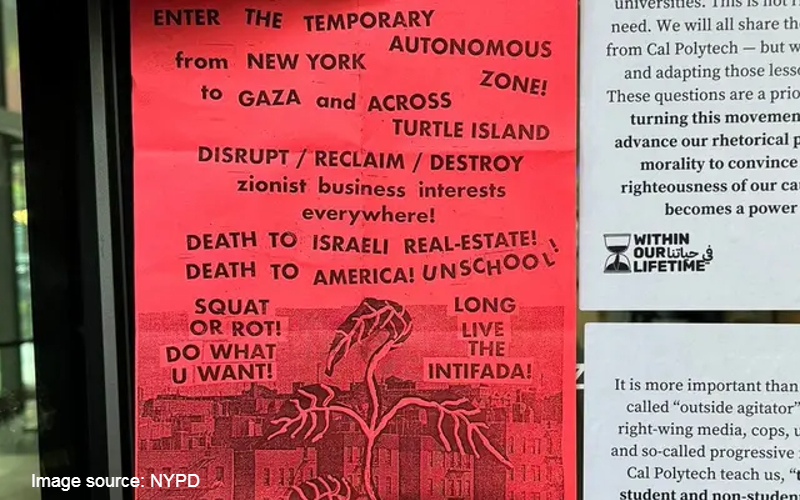Funding from 'usual suspects' with strong ties to Democratic PartyThe foundations funding many of the college protests could also afford legal representation for the protesters should the need arise. Cheryl Chumley took a long look at the protest funding for The Washington Times this week. "It's your usual suspects, right? The George Soros Open Society Foundation, the Tides Foundation, the Rockefeller Brothers Fund; it's Susan and Nick Pritzker, the heirs of the Hyatt Hotel chain." The Pritzkers, she added, not only have their hands in the funding of these groups "but donated to Joe Biden's campaign just a couple of years ago to the tune of $300,000. "So, if you start looking at some of these curious ties, there really does seem to be very many links between the funders of these anti-Semitic displays and the Democrat Party," she concluded. |
Their funding comes from the "usual suspects" of Democratic treasure chests (see sidebar), reports show; and their critics say they can't find Gaza on a map.
But for these protesters, the ones who are legitimate students, Israel is little more than a useful tool to reach a larger goal of weakening America, Cheryl Chumley, online opinion editor for The Washington Times, said on Washington Watch Monday.
"I never thought I would see these protest movements so widespread in America, but the bigger theme here, the bigger issue that we need to concern ourselves with is why this is taking place," Chumley told show host Tony Perkins. "It's not so much about Israel and an anti-Israel agenda, which is part and parcel of it; but the bigger idea is to tear down America, to divide and conquer, which is sort of the Democratic Party playbook."
That strategy, she argued, has been in play since the Obama administration.

"The Democrat Party took a turn from being the pro-America, blue collar-working party to really one that is filled with Marxists and communists and collectivists and those who hate America," Chumley explained. "And one way that they can tear down America from within is to create chaos, division, and violent outbursts."
Images of tent cities on campus lawns, protesters breaking into campus buildings and late-night police raids have filled the news cycle for weeks. Yet less than a month ago, when Harvard's Kennedy School released its annual Harvard Youth Poll, potential voters under 30 cared little about the war between Israel and Hamas. It ranked No. 15 at 34%. The only concern which ranked lower, coming in dead last among the 16 choices, was student debt at 26%.
Chumley said the campus protests are the fruit of years' worth of effort by Democrats in education.
"I would have to say that it appears to me that this is yet another leftist-type strategy to take advantage of the ignorance of youth who have been purposely dumbed down by Democrats in the public school system for years," she lamented. "And now they are using these youthful protesters on college campuses to advance a political agenda that is very anti-Semitic at root."
Anti-Semitism Awareness Act draws fire
Those students' anti-Semitic speech could soon be against the law. The House last week passed the Anti-Semitism Awareness Act with bipartisan support in a 320-91 vote. It's expected to be taken up in the Senate this week.
The bill, which aims to tackle anti-Semitic behavior on college campuses and in other educational institutions, directs the Department of Education to use a definition of anti-Semitism written by the International Holocaust Remembrance Alliance.
The IHRA definition already has been applied in various levels of the federal government. Now it could become law, one that could penalize a person who makes the "claim of Jews killing Jesus or blood libel."
While that's just one of many examples offered by the IHRA that are now a part of the bill, it's the one getting the most attention from conservative critics.
There have been people "alleging crazy things, like you won't be able to read the Bible; it's going to make the New Testament illegal; you're not going to be able to talk about Jesus' death," David Bernstein, a law school professor at George Mason University, told Perkins.

"This is already applied in the federal government, in the educational context, in 30 states, in most of the major cities in the United States. All it does is take a rule that already has been implemented throughout the United States, and applies it, and says, 'We're not just implementing this from an administrative point of view, which could be reversed at any time; we're making it part of the law.'"
Bernstein, who addressed the bill for National Review last week, said such an example would have to be tied to another form of anti-Semitic behavior.
"It would be like if a person [who] ran a large business … happened to be Christian and denied someone a job saying, 'I wouldn't hire that guy, he's a Christ-killer.' The fact that you called him a Christ-killer would be evidence of discriminatory intent," he explained.







